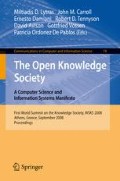Abstract
The growing popularity of web 2.0, particularly social networking tools, among young people makes it attractive for pedagogical use. Successful realization of web 2.0-based learning requires thorough understanding of the potential barriers influencing acceptance of web 2.0 by current and future students. This article presents the findings of a broader research into the use of web 2.0 by the digital generation, young people at the age of entering HE and current students. In conclusion, the article argues for the urgent need to educate current and future web 2.0 users about the relevant issues of privacy and information security.
Access this chapter
Tax calculation will be finalised at checkout
Purchases are for personal use only
Preview
Unable to display preview. Download preview PDF.
References
Shadbolt, N., Berners-Lee, T., Hall, W.: The semantic web revisited. IEEE Intelligent Systems 21(3), 96–101 (2006)
Aroyo, L., Dicheva, D.: The new challenges for e-learning: The educational semantic web. Educational Technology and Society 7(4), 59–69 (2004)
Berners-Lee, T.: The fractal nature of the web (1998) (Retrieved 07/09, 2008), http://www.w3.org/DesignIssues/Fractal.html
Green, H., Hannon, C.: Their space: Education for a digital generation. Demos, London (2007)
Prensky, M.: Digital natives, digital immigrants. On the Horizon MCB University Press, 9(5) (2001), http://www.marcprensky.com/writing/Prensky%20-%20Digital%20Natives,%20Digital%20Immigrants%20-%20Part1.pdf
Conole, G., De Laat, M., Dillon, T., Darby, J.: JISC LXP: Student Experiences of Technologies Final Report (2006) (Retrieved 7 July, 2008), http://www.jisc.ac.uk/media/documents/programmes/elearning_pedagogy/lxp%20project%20final%20report%20dec%2006.pdf
Dutton, W.H., Helsper, E.: Oxford internet survey 2007 report: The internet in Britain. Oxford Internet Institute, Oxford (2007)
White, D.: Results and analysis of web 2.0 services survey. JISC, UK (2007), http://www.jisc.ac.uk/media/documents/programmes/digitalrepositories/spiresurvey.pdf
MacKenzie, D.: The certainty trough. In: Dutton, W.H. (ed.) Society on the Line, pp. 43–46. Oxford University Press, Oxford (1999)
Dutton, W.H., Shepherd, A.: Trust in the internet as an experience technology. Information, Communication & Society 9(4) (2007)
Devedzic, V.: Key issues in next-generation web-based education. IEEE Transactions on Systems, Man, and Cybernetics, Part C – Applications and Reviews 33(3) (2003)
Johnson, S.: Everything bad is good for you: How today’s popular culture is actually making us smarter. Penguin Books, London (2005)
Kohut, A., Parker, K., Keeter, S., Doherty, C., Dimock, M.: A portrait of generation next, Washington DC, USA (2007), http://people-press.org/reports/pdf/300.pdf
Author information
Authors and Affiliations
Editor information
Rights and permissions
Copyright information
© 2008 Springer-Verlag Berlin Heidelberg
About this paper
Cite this paper
Benson, V. (2008). Is the Digital Generation Ready for Web 2.0-Based Learning?. In: Lytras, M.D., et al. The Open Knowlege Society. A Computer Science and Information Systems Manifesto. WSKS 2008. Communications in Computer and Information Science, vol 19. Springer, Berlin, Heidelberg. https://doi.org/10.1007/978-3-540-87783-7_56
Download citation
DOI: https://doi.org/10.1007/978-3-540-87783-7_56
Publisher Name: Springer, Berlin, Heidelberg
Print ISBN: 978-3-540-87782-0
Online ISBN: 978-3-540-87783-7
eBook Packages: Computer ScienceComputer Science (R0)

